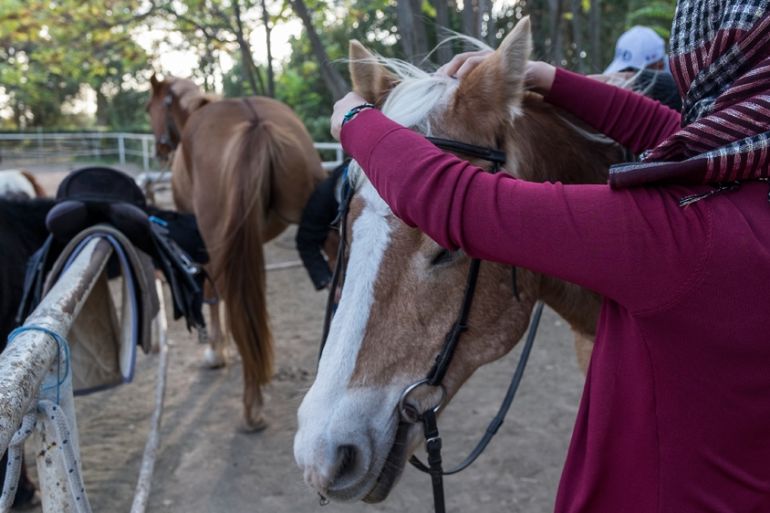Child refugees in Greece ride horses to heal
Hundreds have turned to equine therapy as a method of dealing with post-traumatic stress.

Athens, Greece – Shrieks of terror mixed with squeals of unbridled excitement pierce the quiet afternoon in a small vineyard behind a horse stable in Ilion, a suburb of Athens, Greece.
The noisemakers, two 17-year-old Afghan refugee girls, are riding horses for the first time in their lives.
Keep reading
list of 4 itemsBeyond borders: Migrants online
Tunis police raid sees refugees abandoned near the border with Algeria
‘No turning back’: Carnation Revolution divides Portugal again, 50 years on
Once a week since early October, young Syrian, Afghan and African refugees from camps and shelters across Athens have been brought to the United Pony Caravan to ride and care for horses as part of an equine therapy programme for refugee children stranded in Athens.
The United Pony Caravan, a privately funded organisation, was founded by Joffrey Debut and a small group of horse riders and trainers from France, aiming to help refugee children heal.
In October 2017, Debut and several trainers drove from France to Greece with half a dozen horses and ponies in a trailer hitched to the back of their truck. In the ensuing months, Debut has been giving horse-riding lessons – and life lessons – to hundreds of refugee children.
!['Of course you can get something from horses, but before all of that, it is a tool to make a relationship with these children' [Fahrinisa Oswald/Al Jazeera]](/wp-content/uploads/2017/12/97bc272e37574bdfa68dbc8fb9e5a053_18.jpeg)
“I try to use them [horses] as a link – a link for education, a link for respect, a link for values,” Debut told Al Jazeera. “They are a tool. Of course you can get something from horses, but before all of that, it is a tool to make a relationship with these children.”
Jason Podimatas, operations manager at the Home Project, a privately funded organisation giving shelter to unaccompanied minors in Athens, noted: “These horses give love with nothing in return, and this is exactly what these kids don’t have and what we are trying to give them … All kinds of animals have therapeutic benefits for kids.”
High stakes
Since 2015, more than one million refugees from the Middle East and North Africa have landed on Europe’s doorstep, most entering through Greece and Italy. Fleeing war, persecution and economic devastation, many aim to continue on to central and northern Europe within days or weeks of their arrival.
But after last year’s ratification of a treaty between the European Union and Turkey – which stated that all refugees and migrants arriving in Greece would be returned to Turkey in exchange for increased resettlement of Syrians within the EU from Turkey – and the closure of the Macedonian border in northern Greece, an estimated 50,000 refugees and migrants from the MENA region have been left stranded, according to the United Nations High Commissioner for Refugees (UNHCR).
Earlier this year, Human Rights Watch released a report documenting the “deteriorating mental health of asylum seekers and migrants – including incidents of self-harm, suicide attempts, aggression, anxiety, and depression”. For children, the stakes are even higher.
![Learning to manage a horse helps children to manage their own situations, experts say [Fahrinisa Oswald/Al Jazeera]](/wp-content/uploads/2017/12/74a61b91868e4bc8bb8911f72db6e4a6_18.jpeg)
According to data from the National Center for Social Solidarity, around 9,600 unaccompanied refugee minors have registered in Greece since the beginning of 2016. More than 2,000 still lack adequate shelter.
Amid this backdrop, various individuals and organisations have come together to brainstorm alternative therapy programmes, such as the United Pony Caravan. The Home Project regularly brings children to take part in equine therapy here.
At a recent session, Zehra and Maryam, who asked that their last names not be published, lead their horses out of the stable and begin the process of cleaning them. They shriek anytime the horses make eye contact with them, but eventually their curiosity gets the better of them.
“I come here because I love horses and I love riding,” Maryam told Al Jazeera. “In Afghanistan I thought about it a lot, but I never went … No girls in Afghanistan go for riding; it’s not common, but now that I have the chance, I will use this chance.”
![Participants learn how to care for the horses, including brushing their manes and tails [Fahrinisa Oswald/Al Jazeera]](/wp-content/uploads/2017/12/60b54ad1c8ce4ae2bd2b8d5571fbc4f3_18.jpeg)
With the horses tied to the fence, Debut shows the girls how to properly brush them, comb their tails and attach the saddles. Once mounted, the girls are led through a maze of dirt paths crisscrossing through vineyards and gardens until they reach the arena where Debut runs them through the basics of steering and stopping. By the end of the two-hour lesson, both girls are at a full gallop, their initial fear gone.
“If you cannot manage yourself, you cannot communicate with a horse, so the first thing that you learn with a horse is to manage yourself,” Natasa Skoufi, a horse trainer and social worker for Doctors Without Borders, told Al Jazeera. “They feel their power and they love to do it. When you see your own power, and that you can manage with an animal like this, you gain your self-confidence.”
Sofia Kouvelaki, executive director of the Home Project, said the goal is also to help children overcome mental-health issues, with many suffering from post-traumatic stress disorder.
“All of them have either witnessed violence or have experienced violence themselves, so there’s a lot of trauma,” she said.
“We’ve had victims of rape, victims of trafficking, sexual exploitation, physical abuse and depression that has been caused by the really bad conditions that these kids have experienced … There’s a lot of trauma that needs to be healed. Through the equine therapy, we’ve seen the difference, even from the first session.”
!['Through the equine therapy, we've seen the difference, even from the first session' [Fahrinisa Oswald/Al Jazeera]](/wp-content/uploads/2017/12/e20bc5d176e54b77afbb256803816730_18.jpeg)